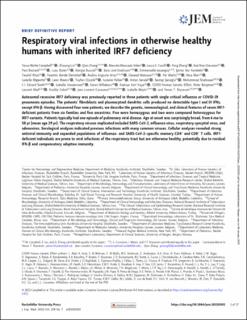| dc.contributor.author | Campbell, Tessa Mollie | |
| dc.contributor.author | Liu, Zhiyong | |
| dc.contributor.author | Zhang, Qian | |
| dc.contributor.author | Moncada-Velez, Marcela | |
| dc.contributor.author | Covill, Laura E. | |
| dc.contributor.author | Zhang, Peng | |
| dc.contributor.author | Darazam, Ilad Alavi | |
| dc.contributor.author | Bastard, Paul | |
| dc.contributor.author | Bizien, Lucy | |
| dc.contributor.author | Bucciol, Giorgia | |
| dc.contributor.author | Enoksson, Sara Lind | |
| dc.contributor.author | Jouanguy, Emmanuelle | |
| dc.contributor.author | Karabela, Şemsi Nur | |
| dc.contributor.author | Khan, Taushif | |
| dc.contributor.author | Kendir-Demirkol, Yasemin | |
| dc.contributor.author | Arias, Andres Augusto | |
| dc.contributor.author | Mansouri, Davood | |
| dc.contributor.author | Marits, Per | |
| dc.contributor.author | Marr, Nico | |
| dc.contributor.author | Migeotte, Isabelle | |
| dc.contributor.author | Moens, Leen | |
| dc.contributor.author | Ozcelik, Tayfun | |
| dc.contributor.author | Pellier, Isabelle | |
| dc.contributor.author | Sendel, Anton | |
| dc.contributor.author | Senoglu, Sevtap | |
| dc.contributor.author | Shahrooei, Mohammad | |
| dc.contributor.author | Edvard Smith, Smith | |
| dc.contributor.author | Vandernoot, Isabelle | |
| dc.contributor.author | Willekens, Karen | |
| dc.contributor.author | Yasar, Kadriye Kart | |
| dc.contributor.author | Bergman, Peter | |
| dc.contributor.author | Abel, Laurent | |
| dc.contributor.author | Cobat, Aurélie | |
| dc.contributor.author | Casanova, Jean-Laurent | |
| dc.contributor.author | Meyts, Isabelle | |
| dc.contributor.author | Bryceson, Yenan | |
| dc.date.accessioned | 2023-01-18T13:04:55Z | |
| dc.date.available | 2023-01-18T13:04:55Z | |
| dc.date.created | 2022-10-24T09:59:13Z | |
| dc.date.issued | 2022 | |
| dc.identifier.issn | 0022-1007 | |
| dc.identifier.uri | https://hdl.handle.net/11250/3044334 | |
| dc.description.abstract | Autosomal recessive IRF7 deficiency was previously reported in three patients with single critical influenza or COVID-19 pneumonia episodes. The patients’ fibroblasts and plasmacytoid dendritic cells produced no detectable type I and III IFNs, except IFN-β. Having discovered four new patients, we describe the genetic, immunological, and clinical features of seven IRF7-deficient patients from six families and five ancestries. Five were homozygous and two were compound heterozygous for IRF7 variants. Patients typically had one episode of pulmonary viral disease. Age at onset was surprisingly broad, from 6 mo to 50 yr (mean age 29 yr). The respiratory viruses implicated included SARS-CoV-2, influenza virus, respiratory syncytial virus, and adenovirus. Serological analyses indicated previous infections with many common viruses. Cellular analyses revealed strong antiviral immunity and expanded populations of influenza- and SARS-CoV-2–specific memory CD4+ and CD8+ T cells. IRF7-deficient individuals are prone to viral infections of the respiratory tract but are otherwise healthy, potentially due to residual IFN-β and compensatory adaptive immunity. | en_US |
| dc.language.iso | eng | en_US |
| dc.publisher | Rockefeller University Press | en_US |
| dc.rights | Navngivelse 4.0 Internasjonal | * |
| dc.rights.uri | http://creativecommons.org/licenses/by/4.0/deed.no | * |
| dc.title | Respiratory viral infections in otherwise healthy humans with inherited IRF7 deficiency | en_US |
| dc.type | Journal article | en_US |
| dc.type | Peer reviewed | en_US |
| dc.description.version | publishedVersion | en_US |
| dc.rights.holder | Copyright 2022 the authors | en_US |
| dc.source.articlenumber | e20220202 | en_US |
| cristin.ispublished | true | |
| cristin.fulltext | original | |
| cristin.qualitycode | 2 | |
| dc.identifier.doi | 10.1084/jem.20220202 | |
| dc.identifier.cristin | 2064215 | |
| dc.source.journal | Journal of Experimental Medicine (JEM) | en_US |
| dc.identifier.citation | Journal of Experimental Medicine (JEM). 2022, 219 (7), e20220202. | en_US |
| dc.source.volume | 219 | en_US |
| dc.source.issue | 7 | en_US |

